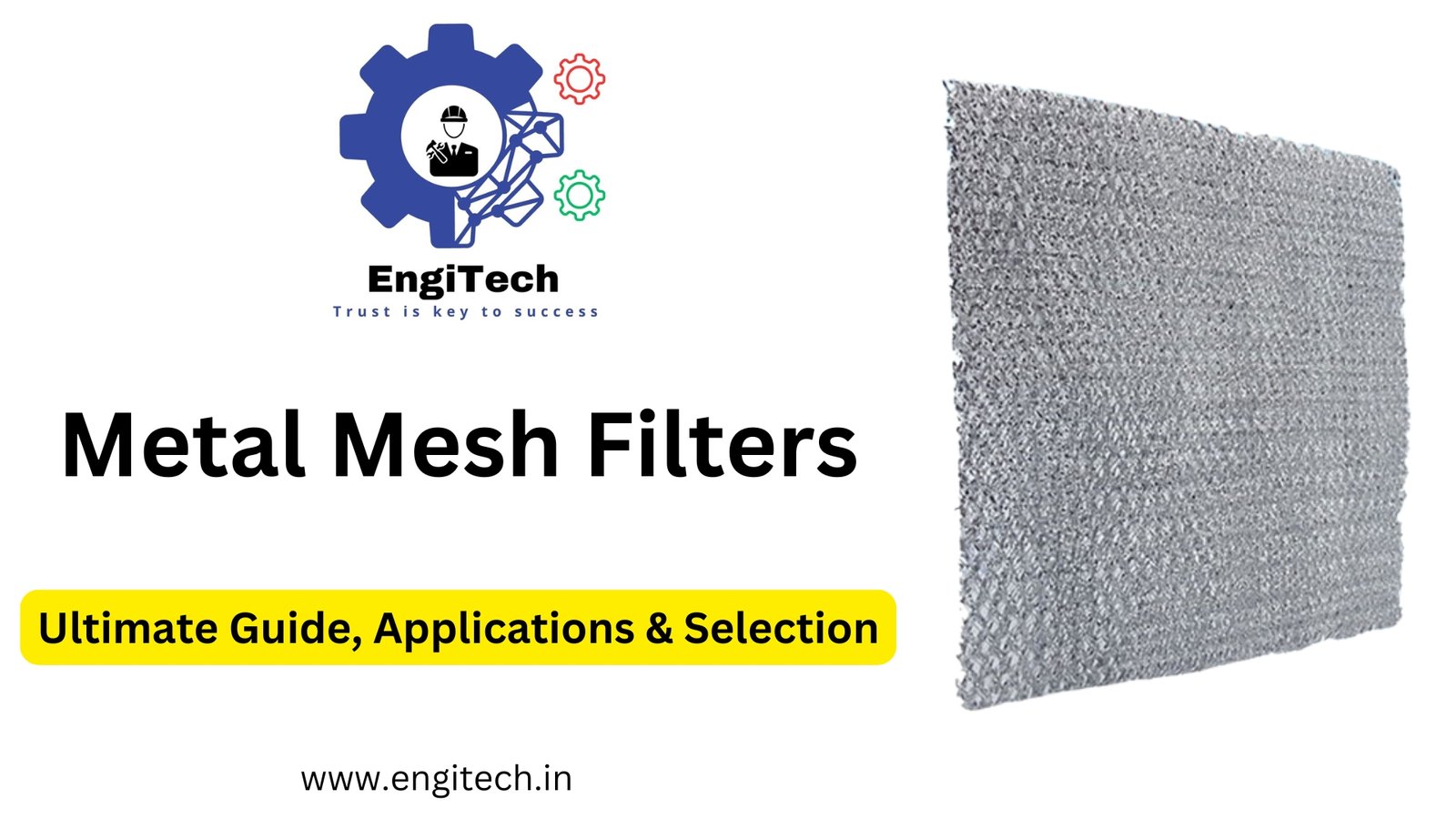Metal Mesh Filters: The Ultimate Guide to Understanding, Selecting, and Using Metal Mesh Filters

Metal mesh filters are a critical component in many industrial and commercial applications where filtration and separation of particles from fluids or air are required. These filters are widely used in industries such as automotive, aerospace, HVAC systems, electronics, and chemical processing. In this comprehensive guide, we’ll dive deep into the world of metal mesh filters, covering everything you need to know about their uses, benefits, materials, and how to choose the right one for your needs.
Whether you’re an engineer looking for the most efficient filtration solution, a buyer seeking the most cost-effective filter option, or a knowledge-seeker trying to understand the technology, this guide will give you all the information you need.
Table of Contents
What Are Metal Mesh Filters?
Metal mesh filters are devices made from woven or knitted wire mesh, designed to filter out solid particles from liquids or gases. The mesh can be made from various metals, such as stainless steel, aluminum, brass, or copper, depending on the application. Metal mesh filters come in various configurations and mesh sizes to suit different filtration needs, from coarse filtration to ultra-fine separation.
Types of Metal Mesh Filters
- Woven Metal Mesh Filters: Woven filters consist of metal wires arranged in a crisscross pattern, forming a mesh that traps particles as fluids or air pass through.
- Knitted Metal Mesh Filters: In knitted filters, metal wires are looped together, forming a three-dimensional structure that offers high filtration efficiency with minimal pressure drop.
- Perforated Metal Filters: Made from punched metal sheets, these filters are commonly used for coarse filtration applications.
Importance of Metal Mesh Filters
Metal mesh filters play a crucial role in ensuring that systems operate efficiently and last longer. In industrial settings, filtration is essential to prevent contamination, reduce wear and tear on machinery, and improve product quality.
Key Applications
- Automotive: Used in oil filters, air filters, and fuel filtration systems.
- HVAC: Metal mesh filters are commonly used in heating, ventilation, and air conditioning systems to improve air quality.
- Electronics: Metal mesh filters protect sensitive electronics from dust and contaminants.
Advantages of Metal Mesh Filters
Metal mesh filters offer several advantages over other types of filters, including:
- Durability: Unlike paper or fabric filters, metal mesh filters can withstand extreme temperatures and harsh chemical environments.
- Reusability: These filters can be cleaned and reused, making them cost-effective in the long term.
- Corrosion Resistance: Filters made from stainless steel or other corrosion-resistant metals can be used in highly corrosive environments.
- Customizability: Metal mesh filters can be tailored to fit specific applications with different mesh sizes and configurations.
- Eco-Friendly: Because they are reusable, metal mesh filters reduce the waste associated with disposable filters.
Materials Used in Metal Mesh Filters
When selecting a metal mesh filter, the choice of material is crucial for ensuring the filter performs optimally in its intended environment. Below are the most common materials used in metal mesh filters.
1. Stainless Steel
Stainless steel is the most popular material for metal mesh filters due to its strength, corrosion resistance, and ability to withstand high temperatures. It is ideal for industries like food and beverage processing, petrochemical, and pharmaceuticals where corrosion resistance is key.
2. Aluminum
Aluminum is lightweight and has excellent thermal conductivity, making it an excellent choice for applications where weight is a concern, such as aerospace and automotive industries.
3. Brass and Copper
Brass and copper filters are mainly used in applications where electrical conductivity is necessary, or where the filter will be exposed to certain chemicals. Brass and copper also offer excellent corrosion resistance.
4. Monel and Inconel
These nickel-based alloys are known for their resistance to corrosion and extreme temperatures. They are typically used in highly corrosive environments, such as marine and chemical processing industries.
Understanding Mesh Size and Filtration Efficiency
Mesh size refers to the number of openings per linear inch in a metal mesh filter. The smaller the mesh size, the finer the filtration. It is important to choose the correct mesh size to balance filtration efficiency and pressure drop.
Common Mesh Sizes:
- Coarse Mesh (10–50 mesh): Used for applications where large particles need to be filtered out, such as in HVAC systems.
- Medium Mesh (50–200 mesh): Ideal for filtering smaller particles in industrial processes.
- Fine Mesh (200 mesh and above): Used for ultra-fine filtration in industries such as pharmaceuticals and electronics.
Factors to Consider When Choosing Mesh Size:
- Particle Size: Determine the smallest particle size that needs to be filtered out.
- Flow Rate: The finer the mesh, the more restricted the flow will be, so ensure the mesh size does not impede the required flow rate.
- Pressure Drop: A balance between filtration efficiency and pressure drop is essential for optimal system performance.
How to Choose the Right Metal Mesh Filter
Selecting the right metal mesh filter for your application involves considering several factors, including the environment, particle size, and material compatibility.
Step 1: Define the Application
The first step is to determine the specific needs of your application. For example, will the filter be used in a high-temperature environment, or will it be exposed to corrosive chemicals? Answering these questions will help narrow down your options.
Step 2: Choose the Right Material
Based on the application, choose the material that offers the best combination of durability, corrosion resistance, and cost. Stainless steel is often a good all-around choice, but in more specialized environments, materials like Monel or Inconel may be necessary.
Step 3: Select the Appropriate Mesh Size
Consider the particle size that needs to be filtered and choose a mesh size that meets those requirements. Remember that finer mesh sizes offer better filtration but may cause higher pressure drops.
Step 4: Consider the Operating Conditions
Be mindful of the operating temperature, pressure, and flow rate when selecting a metal mesh filter. High temperatures may require a filter made from materials like stainless steel or Inconel, while high flow rates may necessitate a coarser mesh to minimize pressure drop.
Cleaning and Maintenance of Metal Mesh Filters
One of the biggest advantages of metal mesh filters is their reusability, but this requires proper cleaning and maintenance. Here’s how you can keep your filters in top condition.
Cleaning Methods
- Backlashing: For liquid filtration systems, backlashing is a common method where the flow is reversed to dislodge trapped particles.
- Ultrasonic Cleaning: This method uses high-frequency sound waves to agitate a cleaning solution, effectively removing particles from fine mesh filters.
- Chemical Cleaning: In some cases, chemical cleaners are used to dissolve contaminants from the filter surface.
Maintenance Tips:
- Regular Inspection: Check filters periodically for signs of clogging or damage.
- Follow Manufacturer Guidelines: Always adhere to the cleaning and maintenance recommendations provided by the filter manufacturer.
- Replace When Necessary: Although metal mesh filters are reusable, they will eventually wear out and need to be replaced to ensure optimal performance.
Future Trends in Metal Mesh Filters
With advancements in manufacturing technology and the increasing demand for filtration solutions, the future of metal mesh filters looks promising.
1. Nanotechnology in Filtration
The integration of nanotechnology is making metal mesh filters more efficient by enabling finer filtration at a lower pressure drop. Nanocoatings and nanowire meshes can help in improving the overall filtration performance.
2. Smart Filters
Smart filters equipped with sensors are being developed to monitor the performance of the filter in real-time. These filters can alert users when maintenance is required or if the filter needs to be replaced.
3. Sustainable Materials
As environmental concerns grow, there is a push towards developing metal mesh filters from sustainable or recyclable materials, which could further reduce the environmental impact of filtration processes.
Frequently asked questions (FAQs) about metal mesh filters
1. What are metal mesh filters used for?
Metal mesh filters are used in various industries to filter out solid particles from liquids or gases. Common applications include air filtration in HVAC systems, oil filtration in automotive engines, and liquid filtration in chemical processing plants. They can handle high temperatures and corrosive environments, making them ideal for demanding industrial settings.
2. What is the difference between metal mesh filters and other types of filters?
Metal mesh filters are known for their durability and reusability compared to paper or fabric filters. They are made from metals such as stainless steel, brass, or aluminum and can be cleaned and reused multiple times. Other filters, like fabric or paper, are often disposable and less resistant to high temperatures or harsh chemicals.
3. How do I choose the right metal mesh filter for my application?
Choosing the right metal mesh filter depends on several factors, including the material to be filtered, particle size, operating temperature, flow rate, and corrosion resistance requirements. Stainless steel is a common choice due to its durability and resistance to corrosion, while finer mesh sizes are used for applications requiring fine filtration.
4. Can metal mesh filters be cleaned and reused?
Yes, metal mesh filters are reusable and can be cleaned using methods such as backflushing, ultrasonic cleaning, or chemical cleaning, depending on the level of contamination. Proper maintenance can extend the life of the filter and reduce replacement costs.
5. What are the common materials used in metal mesh filters?
The most common materials used for metal mesh filters include stainless steel, aluminum, brass, copper, Monel, and Inconel. Each material has its own benefits, such as corrosion resistance, heat resistance, or lightweight properties, making them suitable for specific industrial applications.
6. What is mesh size, and why does it matter in filtration?
Mesh size refers to the number of openings per linear inch of the filter mesh. A higher mesh count indicates smaller openings, meaning finer filtration. The right mesh size depends on the particle size you need to filter. Coarser meshes (lower mesh count) allow for higher flow rates but capture larger particles, while finer meshes (higher mesh count) trap smaller particles but may reduce flow efficiency.
7. How long do metal mesh filters last?
The lifespan of a metal mesh filter depends on the operating environment and how well it is maintained. With proper cleaning and care, metal mesh filters can last for years, significantly reducing the cost of replacements compared to disposable filters. However, extreme conditions, such as exposure to corrosive chemicals or high levels of contamination, may reduce the filter’s lifespan.
Conclusion
Metal mesh filters are a versatile and highly effective solution for filtration in various industries. Their durability, customizability, and reusability make them an excellent choice for demanding applications. Whether you’re working in the automotive industry, HVAC, or chemical processing, understanding the materials, mesh sizes, and proper maintenance techniques can help you select the right filter for your needs.
By following this guide, you now have the insights necessary to make an informed decision about metal mesh filters. If you’re looking to improve system performance, protect sensitive equipment, or ensure product quality, investing in high-quality metal mesh filters will be worth your while.
For more in-depth guides on industrial filtration solutions and the latest innovations in engineering, visit EngiTech. Stay updated with our comprehensive resources and expert insights to help you make better, informed decisions.


